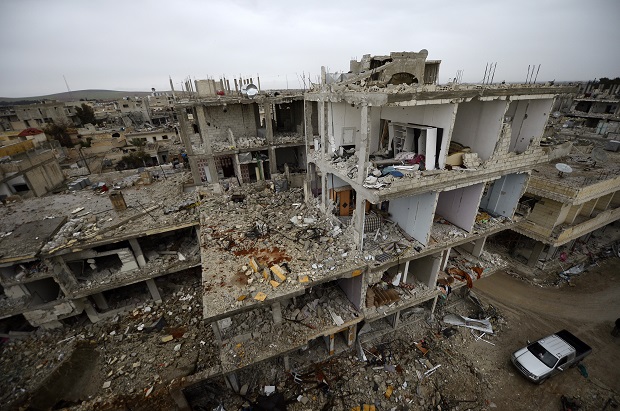
In this picture taken Friday, Jan. 30, 2015, rubble and damaged buildings are seen in the devastated Syrian city of Ain al-Arab, also known as Kobani. The Islamic State group has acknowledged for the first time that its fighters have been defeated in the Syrian town of Kobani and vowed to attack the town again. On Saturday, January 31, 2015, Iraqi Kurdish forces also ousted ISIS fighters from an oil field in Kirkuk. AP
KIRKUK, Iraq – Iraqi Kurdish forces and police retook an oil field in Kirkuk province Saturday that was seized by the Islamic State group overnight, and freed 24 workers who had been taken captive, officers said.
“Peshmerga forces and police cleared the Khubbaz (oil) field a little while ago and were able to enter it after surrounding it for hours,” police Brigadier General Sarhad Qader said of the fighting, adding that they also retook eight villages.
IS had moved into the oil field Friday night and seized 24 workers, who were freed after they withdrew, peshmerga Major General Westa Rasul said.
A police colonel said their liberation was delayed because of fears that the bunker where they were held had been rigged with explosives.
During the fighting on Saturday, a sniper killed peshmerga Major General Hussein Mansur, Colonel Kawa Gharib said.
A peshmerga major was also killed and four more fighters wounded when an explosives-rigged house blew up.
Mansur was the second senior Kurdish officer to die in two days, after Brigadier General Shirko Rauf was killed Friday during a major IS attack in Kirkuk province.
The US-led anti-IS coalition carried out 10 air strikes in Kirkuk province from Friday to Saturday, hitting IS units and vehicles and buildings used by the jihadists.
The bulk of Iraq’s oil output comes from fields in the south, but the government is counting on production of 300,000 barrels per day from fields in Kirkuk in its 2015 budget, so any major loss of output would be damaging.
Last June, IS overran southwestern areas of Kirkuk during a lightning offensive that saw it capture much of Iraq’s Sunni Arab heartland north and west of Baghdad.
That offensive presented both an opportunity for territorial expansion and an existential threat to the three-province autonomous Kurdish region.
Several Iraqi divisions collapsed in the early days of the offensive, clearing the way for the Kurds to take control of a swathe of disputed territory they have long wanted to incorporate into their region over Baghdad’s objections.
But after driving south towards Baghdad, IS turned its attention to the Kurds, pushing them back towards their regional capital Arbil in a move that helped spark US strikes against the jihadists.
Bolstered by the air strikes as well as international advisers and trainers, Kurdish forces have clawed back significant ground from IS.
The conflict is redrawing some of the de facto internal boundaries of Iraq in favour of broader Kurdish control in the north.
RELATED STORIES
Kurds oust ISIS from Kobani— officials
Video: Islamic State group beheads Japanese journalist